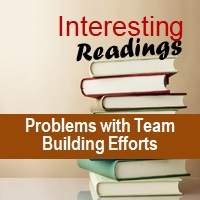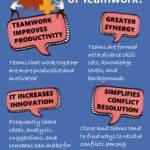
The Problems with Team-Building Efforts and How to Avoid Them
In this article we tell you about the problems with team-building efforts and how you can to avoid them to be successful.
Team-building events can be valued benefits for many employees if managed effectively. But far too often, they fall flat—and amount to costly expenditures that yield little to no value or, worse, hinder employee engagement.
These activities are often considered to provide benefit to employees; unfortunately, if employees don’t like the events, they’re not going to experience much benefit.
Participants must understand what the term “team building” means. Team building is the action or process of causing a group of people to work together effectively as a team, especially by means of activities and events designed to increase motivation and promote cooperation.
Too often, companies interpret the definition of ‘team building’ as simply doing something fun outside of the typical workday setting—rope courses, cooking classes, baseball games. When the focus is not defined or is social rather than building teams or experiential learning, team building will not occur.
How Can You Make Team-Building Events Valuable?
HR and organizational development experts say there are key factors that can boost the odds that team-building efforts will yield desired results.
First, remember that team building should be a process, not an event. Building strong teams takes time.
Consider that your teams are likely always changing. New employees join the team, while other employees leave.
Organizational objectives change. The workplace environment changes.
Once-and-done events, often generate a blip in improvement, but it is not sustained. Team-building events that are sequenced over time, with follow up and cycles of action-learning, can be highly effective.
Second, tie measurable outcomes to these events. Having a clear and explicit understanding of what you want to accomplish—and why—as a result of a team-building event is critical.
Third, share the desired outcomes. One of the most important ingredients to a successful team-building exercise is clarity.
Your team needs to understand what they’re meant to get out of the exercise. If they understand the goal, they’ll naturally be more engaged. The more specific the goal, the better.
“Building a strong team,” for example, is a vague goal. A better goal statement would be “determining how to apply design thinking to create a better candidate experience during the interview process.”
Concrete goals help make team-building exercises feel more relevant.


